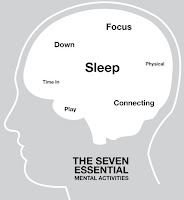Stress and Recovery
" I have observed that if a player spends more than 20 minutes over a move, the result is almost always a mistake." - John Nunn
Physiologists discovered that in virtually every discipline, a dominant performer features the routine use of recovery periods. Athletes who are able to relax in brief moments of inactivity are almost always the ones who deliver when the game is on the line.
With regards to chess, the quality of a chess player's thought process will be higher if it is preceded by a period of relaxation. Improvement in play can be noticed if the mind releases some of the tension and not to think long and hard (all the time) during a game.
"Time-frame" of Training
Scientists refer to "proper timing of training" in relation to the scale of our mental activities, and how we are able to attain maximum performance in it.
GM Grivas, mentioned in his writing that science unanimously accepts the following categorization of people:
1. Larks (early bird): their mental processes are most efficient during the first half of the day, falling off during the second half. Approximately 25% of the world's population belongs in this category.
2. Owls (night bird): their mental processes are most efficient during the second half of the day and especially during the evening hours. They usually go to sleep late and wake up accordingly late. Approximately 30% of the world's population belongs in this category.
3. Hummingbirds (arrhythmics): for these people mental processes do not display any special ups and down during the day or night. Approximately 45% of the world's population, the largest part, belongs to this category.
The Greek GM also explained that in practice, all top chessplayers belong to the 'Owls' category. Simply because it is directly related to the standard time-frame of chess competitions, which mostly take place during the second half of the day. Therefore, chessplayers 'must' place himself in this category (as far as possible) and adapt his training schedule accordingly.
_ _ _ _ _ _ _ _ _ _ _ _ _ _ _ _ _ _ _ _ _ _
_ _ _ _ _ _ _ _ _ _ _ _ _ _ _ _ _ _ _ _ _ _
How
to study chess effectively?
Know the general principles of effective study and get the maximum benefit from your training. It will help you to improve any skill (not just chess skills) effectively!
This course provides a complete and effective "training program" from
starter to Grandmaster:
starter to Grandmaster:



No comments:
Post a Comment